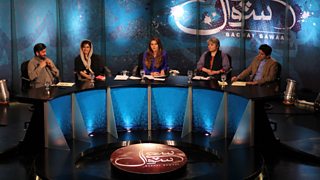Addressing diversity in Pakistan鈥檚 media
Rukhsana Ahmad
Writer and Trainer, 主播大秀 Media Action
Tagged with:

Sachay Sawal (True Questions), 主播大秀 Media Action electoral debate show in Pakistan
For me, as a Karachi-ite, born and bred, the invitation to be a trainer on The Bigger Picture: Media, Representation and Inclusion in Pakistan, was irresistible. Here was my chance to revisit my former hometown, not for personal reasons as I often do, but as a writer hoping to engage in stimulating conversations with like-minded scriptwriters and talkshow teams from Pakistan.
When I migrated from Pakistan to London decades ago, I went from being part of a “Pakistani” majority to being seen as a member of a minority group. First, I became a “British Asian”, then a “British Pakistani” and now I’m described as a member of the “BME” (black and minority ethnic) community. Consequently, I have some understanding of the problems caused by labels.
In many countries, unless the media is sensitive to representing minorities, their perspective is often ignored or oversimplified. That strikes me as true of television in Pakistan today. Unlike the Pakistan of my memory where religious minorities seemed to be celebrated in the media (I’m thinking of Pakistani Christians such as the popular singers “The Benjamin Sisters” and the towering politician Chief Justice Alvin Cornelius or Parsis like the renowned journalist Ardeshir Cowasjee) - today’s media seems curiously devoid of personalities from our minority communities.
主播大秀 Media Action’s plan to deliver a two-pronged programme designed to address the lack of religious minority representation in Pakistan’s media seemed timely and wise. One strand of the workshops was for television drama writers while the other targeted producers and talk show hosts. Both categories of programming are significantly influential even if their audiences differ widely. An online iLearn training module specially designed by 主播大秀 Media Action to induct entrants into the course, complete with a forum and face-to-face learning, supported the participants.
Developing skills
The objective of the scriptwriting workshops was to develop the skills of experienced writers to create nuanced and entertaining drama that seamlessly incorporates characters from religious minority groups in Pakistan and includes stories of discrimination and conflict in a sensitive and non-inflammatory manner.
The talk show strand aimed to develop the skills and confidence of producers and presenters in order for them to introduce balanced content on their shows. This is essential to help the media present issues affecting religious minorities in a spirit of tolerance and inclusion - and with due regard to the risks involved for journalists and contributors, which can include threats and even violent attack from extremists.
Each workshop employed a combination of instruction and creative play to help participants uncover new approaches to TV. There were debates and discussion, analysis of clips of TV content from overseas, writing exercises designed to polish their craft and practical group work and brainstorming to develop new ideas for innovative and inclusive programmes.
Fortunately, almost all the major broadcasters in Pakistan: HUM, Geo, SAMAA, AJ, Dawn and PTV nominated high-profile and emerging TV hosts, producers, writers, editors and content managers for this course. They included a mixture of young and experienced writers and TV script department professionals who wanted to broaden their interest and stimulate their writing.
Laughter and tears
As in the UK, scriptwriters in Pakistan walk a tightrope between chasing ratings in a highly commercialised sector and achieving their own creative objectives. For them, learning how to approach issues of diversity, how to polish their writing and how to pitch and sell scripts and new storylines that might include unusual characters from religious minorities became an exciting quest. It released, at various points, laughter and tears, energy and originality and a willingness to engage with the hidden diversity in their midst.
The Bigger Picture: Media, Representation and Inclusion in Pakistan is funded by the UK’s Foreign and Commonwealth Office (FCO).
Related links
- Follow 主播大秀 Media Action on and
